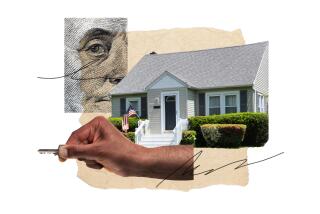COLUMN RIGHT / LLEWELLYN H. ROCKWELL Jr. : Call for Quotas Ignores Facts on Mortgages : Lenders look first at credit-worthiness; if that’s banned, we’ll all end up paying.
- Share via
A recent study from the Federal Reserve says that banks systematically discriminate against minority mortgage applicants. As a result, the Fed has joined civil-rights groups and the 1992 Democratic Party platform in calling for race-based mortgage lending, which the Clinton Administration will undoubtedly implement.
Unfortunately, these claims of victimhood are based on methodological error, for the Fed ignored the grounds on which people are granted or not granted credit.
To get a home mortgage, for example, you have to have a good job history, the necessary income, a decent credit rating and some savings. And you can’t have too much debt for your income. These are the attributes of credit-worthiness, one of the few meritocratic concepts still extant from the old America, and therefore under attack. The Fed study ignored them all.
It is true that 37.6% of blacks are rejected for conventional loans versus 26.6% of Latinos and 17.3% of whites. But to conclude that banks are racist is only a demonstration from that ancient political text, “How To Lie With Statistics.” For example, although only one national story mentioned it, Asian-Americans got proportionately more mortgages than whites (Asians were turned down only 14.3% of the time). Are bankers “yellow supremacists?” Or are Asians, on average, better qualified by the normal standards of credit? Obviously, it is the latter.
But such a conclusion is intolerable when any group differences are seen as evidence of unequal treatment. It violates the ethics of our day to point out that equal treatment can lead to unequal results. That Asians get more loans is a good case in point: The process is fair, but the results are unequal.
And this is true of all groups under consideration. Are we to conclude that Latinos are irrationally favored over blacks because they get more mortgages? Or is this simply a reflection of credit-worthiness?
While it’s true that blacks on average have weaker credit histories, fewer assets and less income than other groups, this doesn’t mean they can’t get loans. Today, 62.4% of blacks who apply for loans get them.
In an alternate (and unpublicized) set of data, the Fed adjusted the racial-lending difference for income. Among the median income group, this narrowed the black-white gap by six points. Undoubtedly, further adjustment would eliminate the gap. For example, the lending split between high- and low-income whites is as large as the gap between the races.
All this means that credit markets, like other markets, are rational. Even among rich whites, 10% are turned down, showing that other factors are critical in granting loans.
But, as usual, rationality flies out the window when politics comes in the door. Activist groups pride themselves on intimidating even the largest banks into race-based lending. Their studies, similar to the Fed’s, always conclude that white lenders are discriminating against black applicants. These organizations seek to outlaw traditional credit standards, for now that money for the welfare state is drying up, the banking system is seen as a pool of redistributable funds.
Many federal, state and local laws already outlaw discrimination in lending. The Community Reinvestment Act mandates special treatment for minorities. And the Clinton Administration will further tighten the regulations. But the trend is driving bankers nuts.
For many reasons, bankers already compete for every credit-worthy minority applicant. Now it is the credit-unworthy they are being forced to serve. But what happens when these loans default?
The federal government’s mortgage agencies will have to buy them and repackage them for sale on the secondary market at a huge discount, just like the savings and loan debacle. Billions of dollars could be lost.
The traditional system of credit and its enforcement have been under liberal attack for decades. But racial lending is the wits’ end of anti-discrimination laws. Considering that taxpayers will be forced to pick up the bank-bailout tab, what we need is not affable and easy-going lenders, but crabby old-timers willing to point out that there is no easy path to the bourgeois life.
Pleas of victimization may pay in the short run, but they will never inculcate the values necessary to a good credit rating.
More to Read
Inside the business of entertainment
The Wide Shot brings you news, analysis and insights on everything from streaming wars to production — and what it all means for the future.
You may occasionally receive promotional content from the Los Angeles Times.










